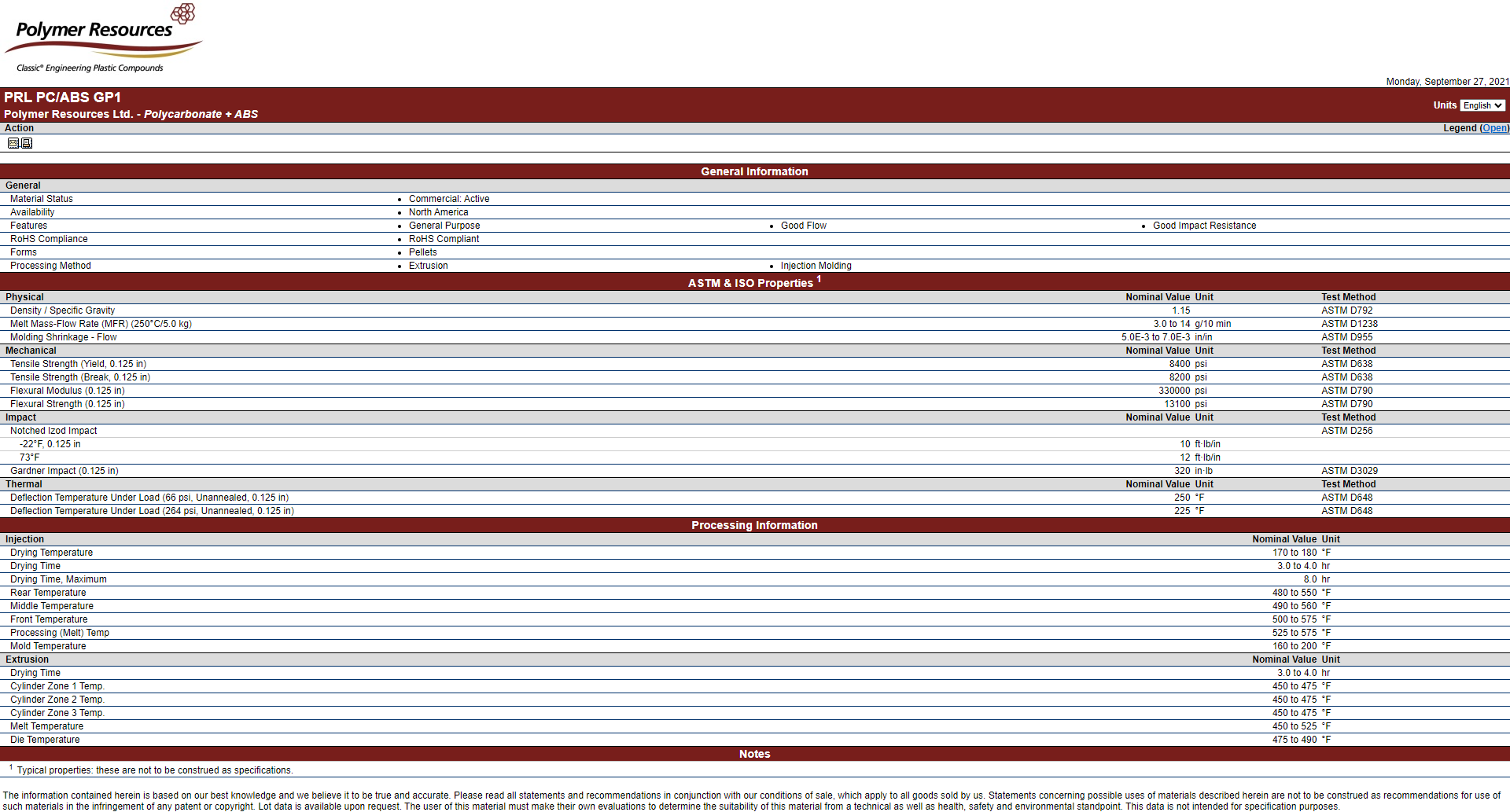PC/ABS Resin
What is a PC/ABS Resin Material Blend?
PC/ABS (polycarbonate / acrylonitrile-butadiene-styrene terpolymer blend) is a thermoplastic alloy of (PC) polycarbonate and (ABS) acrylonitrile-butadiene-styrene. Both PC/ABS materials are well known amorphous plastics. Alloying these two materials enhances processability, and provides non-halo flame retardancy.
Polycarbonate (PC) is a rigid thermoplastic that provides clarity, toughness, and good heat resistance. By itself, polycarbonate has reasonable resistance to burning, and that resistance increases by adding flame retardants that are typically halogen-containing. Acrylonitrile-butadiene-styrene is a well know rigid thermoplastic that offers both moderate impact and moderate chemical resistance. The heat resistance of acrylonitrile-butadiene-styrene is lower than that of polycarbonate. Like polycarbonate, halogen containing additives are used to increase resistance to burning.
Most polymers tend to undergo a decrease in viscosity as shear rates increase. That behavior allows modest increases in injection pressure to help fill injection molded parts. Since polycarbonate very gradually decreases in viscosity as shear rates increase, it can be a challenge to process. While ABS is used in many applications, the usefulness of ABS material is limited by medium heat resistance, and by medium impact performance. Flame retardant grades of both PC and ABS primarily use “halogen FR technology,” and use of that technology can limit applications. These limitations can be overcome by using compounding technology to produce PC/ABS alloys.
ABS Material and PC – It’s Tough
Unlike PC, alloys of PC/ABS do undergo a significant decrease in viscosity as shear rates are increased. This allows PC ABS resin to be processed more easily than pure PC. PC/ABS materials are very tough materials. Although they are not as tough as PC alone, they are much tougher than ABS. They also have much higher heat resistance than pure ABS. A “non-halogen” flame retardant technology is used in FR PC/ABS blends. This expands the applications for this tough, moderate heat resistant material.
Although Polymer Resources offers PC/ABS blends in a wide range of melt flows, we are always willing to produce products within a 5 unit sub-range to suit a customer’s specific needs.
ABS Material and PC – Powerful and Versatile
ABS/PC is a high-performance thermoplastic combining heat, strength, and impact resistance. This versatility makes ABS PC a sought-after material in the automotive and electronics industries.
ABS/PC offers powerful benefits, whether it’s durable automotive components or protective electronics housings.
ABS PC Additives, Modifiers, and Reinforcing Agents:
- Additives – UV stability, easy release (mold releases), colorants, and other stability additives
- Modifiers – Flame retardants, impact modifiers, flow enhancers
- Reinforcing Agents – Glass fibers, mineral fillers
PRL Alternative Material Solutions
Example: If you’re looking for Trinseo Pulse alternatives or Sabic Cycoloy alternatives: find the product in the relevant row and look to the leftmost row to find our alternative.
Applications of PC/ABS and ABS Materials
PC/ABS and ABS materials are widely used across various industries due to their excellent properties. In the automotive sector, they are employed for interior and exterior components due to their durability and impact resistance.
The electronics industry utilizes these materials for housing and components because of their heat resistance and strength.
In consumer goods, PC/ABS and ABS materials are favored for their versatility and aesthetic qualities, making them ideal for everything from household appliances to toys. Additionally, the medical device industry relies on these materials for their reliability and safety in producing a range of medical equipment and instruments.
PRL Grades
- PRL PC/ABS-GP1
- PRL PC/ABS GP IM
- PRL PC/ABS GP HH
- PRL PC/ABS FR
- PRL PC/ABS G10
- PRL PC/ABS G20
- PRL PC/ABS G30
- PRL PC/ABS FR UV (f2)
Covestro Bayblend®
- T45, T65, T85
- T45, T65, T85
- FR3005 HF
- Bayblend® T88-GF10
- Bayblend® T88-GF20
- Bayblend® T88-GF30
Trinseo Pulse™
- Pulse® 830, 1300series
- Emerge® 7100
- Emerge® 7560, 7590
- Emerge® 7700
- Pulse® 630GF
SABIC Cycoloy®
- C1110, MC8002
- C1110HF, C1950
- C2950, C2951, C6200, C6600, C6800
- C2800, C2950 HF, C6600, C6840
- C6600
- C4210
- C4220; CM4300
Trinseo Emerge™
- Pulse® 830, 1300series
- Emerge® 7100
- Emerge® 7560, 7590
- Emerge® 7700
- Pulse® 630GF
PRODUCT Q&As
Q. Is PC/ABS a copolymer?
Q. What is PC/ABS used for?
Q. Is PC/ABS brittle?
In general, the impact behavior of polymers is heavily dependent upon temperature. At higher temperatures, plastics are more ductile and demonstrate high impact. However, at temperatures drop below 20F, some materials start to become brittle. This brittleness tendency increases as the temperature decreases. The ductile to brittle transition point depends upon the glass transition temperature (Tg) of the material.
Q. Is PC stronger than ABS?
Our Mission
My mission at Polymer Resources has not changed since I founded this company more than four decades ago. It includes continuing our tradition of financial stability, sustainable growth and visionary leadership that compounds success for customers, suppliers and employees. It also means proudly manufacturing our products in America, and making them available to the global marketplace.
Les Klein, Chief Executive Officer, Polymer Resources, Ltd.


 Print
Print Download
Download Email
Email
